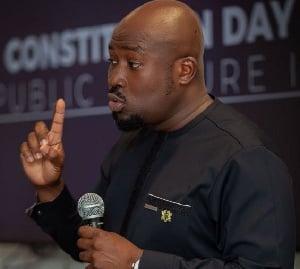Senyo Hosi, the Convener of the One Ghana Movement, has taken to social media to defend Dr. Matthew Opoku Prempeh, commonly known as NAPO, against criticisms labeling him as arrogant. NAPO, who is currently the Vice Presidential Candidate for the New Patriotic Party (NPP) in the upcoming 2024 elections, has faced scrutiny regarding his demeanor and communication style. In his Facebook post on October 21, Mr. Hosi emphasized that while NAPO may express his views vigorously, this assertiveness is not indicative of arrogance. Instead, he characterizes NAPO’s passion as a reflection of his commitment to his beliefs and responsibilities.
Hosi clarified that NAPO’s apparent forcefulness in articulating his opinions should not be misconstrued as inflexibility. He noted that NAPO possesses the ability to accept when he is wrong, a quality that denotes humility and an eagerness for personal growth. This willingness to engage in dialogue and self-reflection enhances NAPO’s leadership effectiveness. Mr. Hosi shared his personal experiences working with NAPO, stating that the process was demanding but ultimately rewarding due to NAPO’s dedication to understanding subjects thoroughly. Such characteristics, according to Hosi, underscore the notion that strong convictions can stem from a deep moral responsibility rather than arrogance.
Drawing from his collaborative experience with NAPO, Mr. Hosi described how NAPO approaches discussions with rigor. He believes that NAPO’s thorough interrogation of topics and insistence on rational discourse elevate the conversation rather than stifle it. Moreover, he highlighted that expertise does not intimidate NAPO; instead, he encourages logical arguments and thorough evaluations, which showcase his commitment to intellectual engagement. As Hosi noted, the dynamic between those who possess authority on subjects and NAPO’s inquisitive nature provides a sense of credibility to the debate.
Hosi’s reflections on NAPO capture a complex portrait of a leader who is deeply passionate, knowledgeable, and open to opposing viewpoints. He underlined the distinction between confidence and hubris, suggesting that observers may misinterpret assertiveness for arrogance based on their personal perceptions. Mr. Hosi reiterated that everyone may have different experiences with NAPO, but his own interactions depict a man driven by conviction rather than a sense of superiority. Such differentiation is critical, especially in the politically charged climate leading up to an election.
In concluding his defense, Hosi expressed that judgment of individuals often hinges on subjective experiences and biases. He emphasized that the thin line between confidence and arrogance can obscure an objective interpretation. The public perception of politicians can vary significantly, influenced by personal interactions and the narratives surrounding their public personas. Hosi holds that NAPO’s qualities of passion and a readiness to debate exemplify a type of leadership that is not only effective but necessary in today’s complex political landscape.
Overall, Mr. Senyo Hosi’s post serves as a clarion call for a more nuanced understanding of leadership qualities. By positioning NAPO as a figure of conviction with a willingness to engage thoughtfully in debate, he advocates for recognizing the merits of assertiveness when driven by genuine belief rather than arrogance. This reflection on leadership, particularly in the context of Ghana’s political discourse, invites stakeholders to consider the definitions and perceptions of arrogance versus confidence as they navigate the complexities of political representation and civic engagement.














